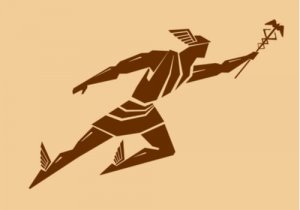The Myth of Hermes, the Divine Messenger

The myth of Hermes tells us about one of the most multifaceted gods in all of Greek mythology. He was one of the most active and restless and, for this reason, he was considered to be the protector of multiple activities, such as commerce, guile, borders, and the travelers who crossed them. Hermes was also considered to be the protector of thieves and liars, the one who guided the souls of the dead, and a divine messenger.
Mythology represents him as a beautiful, athletic young man who never stopped talking and loved to make jokes. He wore a hat and had wings, either on his sandals or on his feet. This allowed him to move quickly wherever he needed to go.
Likewise, the myth of Hermes tells us that this young man always carried the caduceus, a magical staff that he could put gods and mortals to sleep with, and with which he led the souls of the dead to the underworld.
Hermes was the son of Zeus and Maia the Pleiad. He was the chief of dreams, the guardian of the gates, the spy in the darkness, and, finally, became a messenger of the gods.
The myth of Hermes is actually many myths combined. Even though he wasn’t the main character, he appeared in many of the most relevant episodes of Greek mythology.
The myth of Hermes and the lyre
The myth of Hermes says that he was born in a cave on Mount Cyllene in Arcadia. He was only a few days old when he escaped from his crib and ran through the fields. He walked so far that he reached a meadow where his brother Apollo grazed the herds of oxen and cows. When he saw them, temptation overcame him and he decided to steal the oxen and take them to a nearby cave.
Once he had hidden his booty, Hermes returned home. Before he arrived, he saw a turtle and immediately got an idea. He killed the turtle, took out its insides, and then stretched some cords, made from ox guts, over its shell. That, as the legend goes, is how he invented the lyre. Then, he went back to his crib and fell asleep.
When Apollo realized that his animals had been stolen, he used his powers of divination to find the culprit. That’s how he discovered it was Hermes and went before Zeus to accuse him. Maia, Hermes’ mother, tried to plead his innocence by pointing out that he was just a helpless baby. However, Zeus wasn’t fooled and demanded that the boy return what he had stolen.
Overcome by his father’s authority, Hermes went to the cave where he had stored his booty and returned the cows and oxen to Apollo. However, Apollo was amazed by the lyre that Hermes had made.
Thus, he agreed with the winged god to exchange all his cattle for the instrument. Hermes accepted and also received a rod, with which the boy then built his favorite weapon: the caduceus.
Hermes’ adventures
The mythical Hermes had many adventures. One of the most notable ones occurred when his father, an unfaithful god by all accounts, was caught by his wife, Hera, committing adultery with Io, a priestess of Hera herself.
When she discovered the affair, Zeus wanted to protect Io by turning her into a white calf. But, his wife, always on the watch, sent Argos, a monster with a thousand eyes, to watch over her, so that no one would come near her.
However, Zeus commissioned his son Hermes to free his lover. The messenger of the gods sang beautiful songs to the monster and then entertained it with his stories and anecdotes. In this way, he managed to put it to sleep and was able to fulfill the mission his father had entrusted to him.
The myth of Hermes tells that this god also played an important role when he gave Perseus some winged sandals. This magical footwear was decisive in Perseus’ victory over Medusa. Hermes also led Perseus’ soul to the entrance of the underworld, as was his custom.
Hermes also played a very prominent role in the Trojan War, siding with the Greeks. This god was also very lovable and had numerous offspring. His most famous son was Pan, the god of nature and herds. The word “hermeneutics”, or the art of interpreting hidden meanings, is derived from “Hermes”, who in Roman mythology was known as Mercury.
All cited sources were thoroughly reviewed by our team to ensure their quality, reliability, currency, and validity. The bibliography of this article was considered reliable and of academic or scientific accuracy.
Vernant, J. P. (2001). Mito y pensamiento en la Grecia antigua. Ariel.
This text is provided for informational purposes only and does not replace consultation with a professional. If in doubt, consult your specialist.








